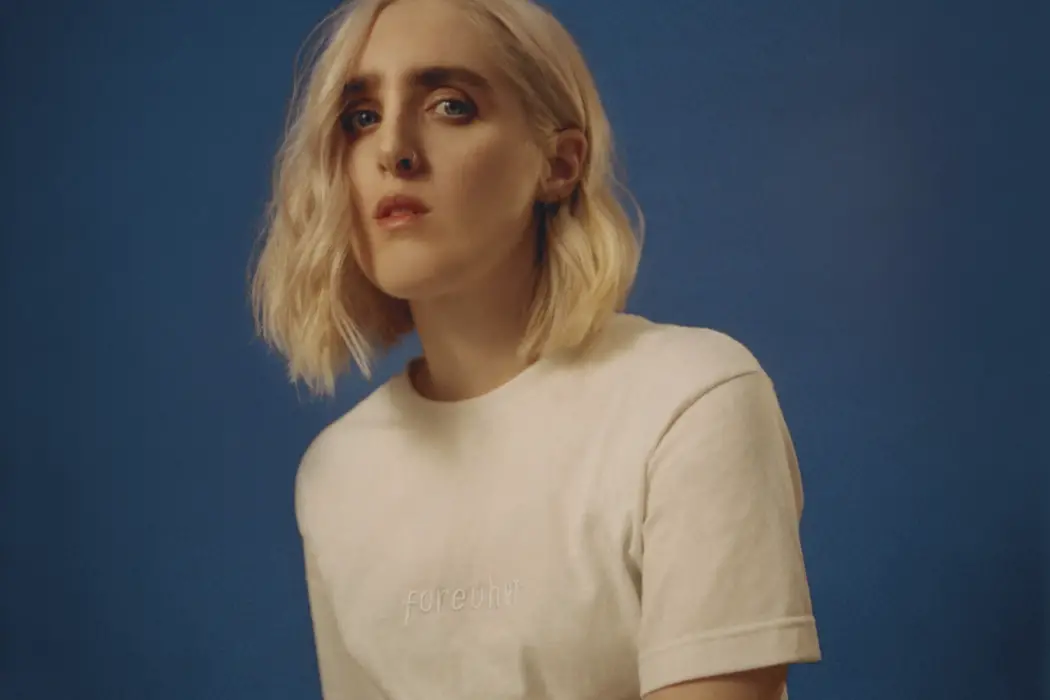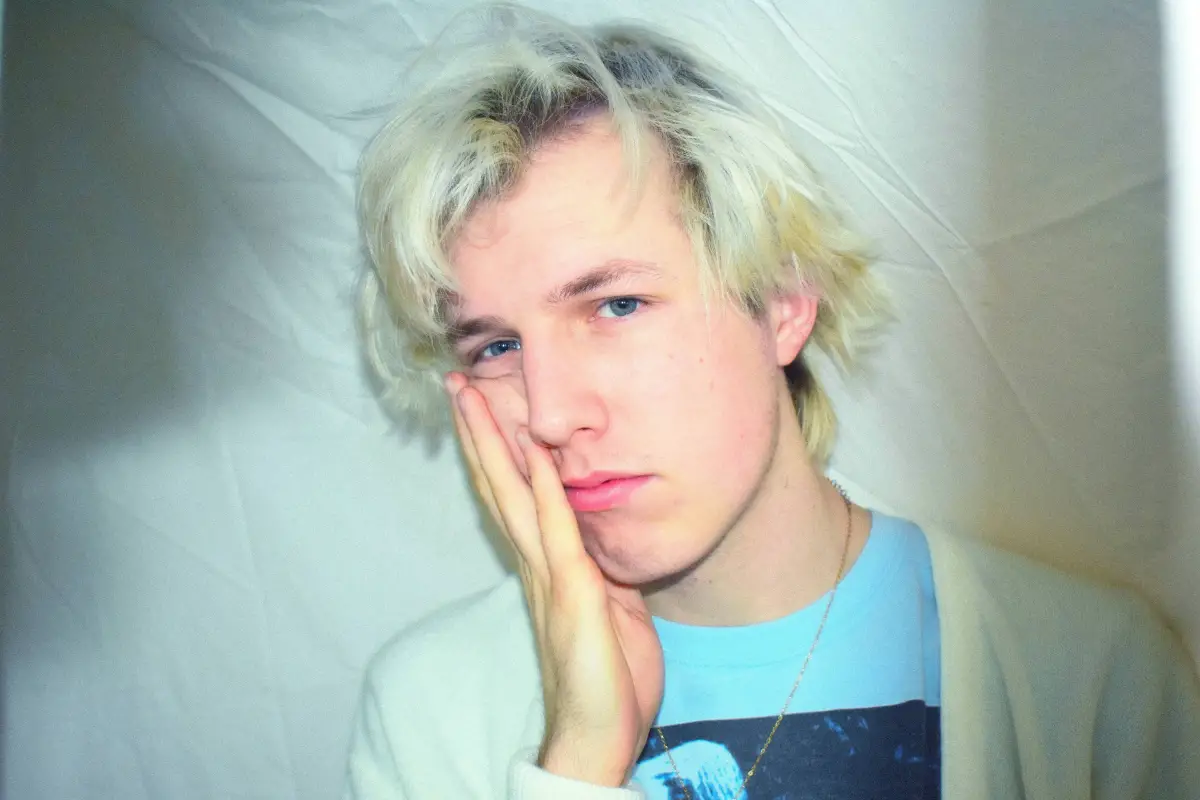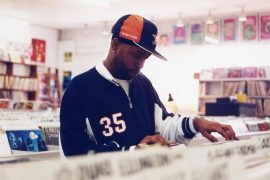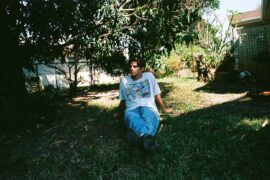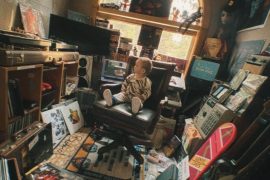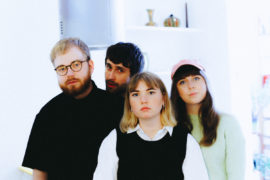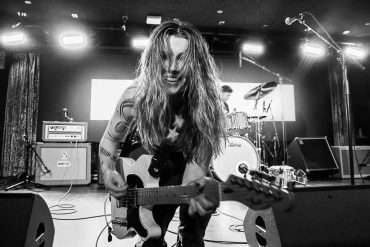British artist Shura talks about how love, finding happiness, a fear of planes, Carrie Fisher, a 90-year-old man from Texas’ love story, and religion, came together to create her second and most expansive, experimental, and romantic album yet, ‘forevher’.
— —
The opening of Shura’s forevher is simple. Piano chords bang on in the background in an uncomplicated fashion while she repeats “I’ll write a song for you, that’s me, just a sweet melody”, allowing herself to go slightly off-key at the end. The intro is barely over one-minute long, and yet it represents the journey you’ll be taken on on the next 43 minutes perfectly.

Here’s Shura, an artist whose debut album Nothing’s Real was an explosive, ambitious, and meticulous ‘80s synth-pop record that dealt with anxiety and heartbreak, stripping it down to the bare minimum: just her and a piano. It’s a symbol of the transparency and confidence with which Shura is now telling stories. “that’s me, just a sweet melody” is Shura opening the door for you to come inside and see what’s been going on with her for the last two years, she’s letting you in and showing you every part of her, flaws and all, with no shame.
forevher (pronounced forever) is an ode to the wonders of love and being in love. After meeting her girlfriend online at the end of the Nothing’s Real campaign, Shura’s life changed completely. She fell in love, eventually moved from London to New York, travelled a lot, and wrote an album about everything in between. With her newfound happiness taking centre stage, the anxiety-riddled ‘80s synths were replaced by soul-influenced melodies, major chord progressions, and the occasional AutoTune. It’s an ambitious, confident, and romantic album that fills you up with joy and allows you to find hidden gems on every listen. It’s indulgent and all-encompassing in the best way, just like love is.
Shura spoke to Atwood Magazine about how love, finding happiness, a fear of planes, Carrie Fisher, a 90-year-old man from Texas’ love story, and religion can together to create her second and most expansive, experimental, and romantic album yet, forevher.
Listen: forevher – Shura
A Conversation with Shura
Atwood Magazine: Hi Shura, how are you doing?
Shura: Really good! I played my first show in a couple of years last week and it was really fun to be back onstage again. Normally when I’m in the studio I’m super focused on making a record, and I think maybe the last six months I’ve been going to gigs, a lot of my friends have been playing, and I’m like “Ooh, I kind of want to do that again”. Before that I wasn’t thinking about it at all, and closer and closer I’ve gotten to announcing the record – because I finished it in January – and the closer we’ve gotten to announcing it I’ve been getting more and more excited to be on stage again.
How was the show?
Shura: It was great, it was so fun. So many things went wrong, like technically, which is perfect, you always want that to happen on your first show so you can fix it – if it happens in the middle of your tour you’re like “What?:” – so it was kind of great that it happened first. But also what was really nice is that it went wrong, some of my gear malfunctioned, and then all of the fans were singing along with me to keep the song going and it was a really emotional moment, to not have played a gig for two years and then come back and have all these people just sing along with me. I was almost crying at points, it was super emotional.
I have a friend who was there and she really enjoyed it, said it was amazing.
Shura: That’s good. I’m glad we only charged five pounds for it, put it that way, with all the mistakes (laughs).
She didn’t even mention technical difficulties, all she said is that it was great. I feel like when an artist is coming back from hiatus people are so excited to just hear from them and have them there, they’ve missed them so much, the emotion just rules that moment.
Shura: Oh, 100%. I think that was the comforting thing as well, my twin said to me “They’re just going to be so happy that you’re back. Don’t worry, all you need to do is stand there.” And that’s a really comforting thing to remember, that you’re enough. It’s good to remind yourself of that, sometimes we can get really nervous and anxious and scared and it’s like “I haven’t done this for a while” but just turning up and being there and having a different and new story to tell is enough.
And it’s such a beautiful story. Your album is incredible.
Shura: Thank you.
I love Nothing’s Real, and I think that album is so much fun, but Nothing’s Real and forevher have very different energies. The first is very anxious and frantic, and forevher is a lot more mature and calm.
Shura: Absolutely, and I think that was something I was trying to achieve. For me Nothing’s Real felt very much like a kind of high school record, a teenage record. And forevher is my first record as a young woman, so they have very different energies. Nothing’s Real is full of anxiety, and this record feels more like I’m basking in happiness and joy. Someone described it as slinky the other day, and I really like that, I feel like this is my slinky record. They are really different, the themes are different, but the way that I speak about my differences, there’s a commonality, a specificity that’s still there.
What happened in your life in between Nothing’s Real and forevher?
Shura: When I was just finishing touring the first record I met my now girlfriend online, I was still in America at the time, and she lived in New York and I was touring and living in London, so we didn’t arrange to go on a date or anything, we just talked – whether it was texting or on the phone – for four months. When it got to the stage where we were talking every day and having telephone conversations that were four, five, six hours long, I kind of went “Should we go on a date then?” and I tried to invent some reason for me to be in New York like “I’m sure I can do something there, I can have a meeting”. So basically I said I’d stay for a week and have this meeting, and I booked a hotel for the week in case it went really wrong, and we went on a date and it went really well. The last couple of years I’ve been travelling back and forth between New York and experiencing new things, and having a bit of time to live life, you know? I went to Mexico, had a bit of time to myself which was really important. The songs that I was writing at the very end of Nothing’s Real were actually very different to what’s on the record now. The only song that stayed from that time is “religion” which is kind of the closest-sounding song to Nothing’s Real. It’s probably the link between the two records. So yeah, just been living life and falling in love.
When you compare both records, also in terms of sound, there’s a clear difference. What made you want to change directions and go for the sound you did in forevher? Because it sounds different to what the possibilities could’ve been after Nothing’s Real.
Shura: So the way that that happened was that when I realised that a lot of this record was essentially going to be about love, a love story that happened in a really modern way (as in we met online and were talking on WhatsApp and Skype), I decided I want to mix something really classic with sounds that are modern. I was listening to a lot of soul records, and I really wanted to use the palette of the piano and live drums and laying everything down to tape and having that live bass, real instruments played by humans – because everything on Nothing’s Real was very rigid and absolutely correct timing-wise and perfect – whereas I wanted this to have this old school, human vibe to it mixed with things that absolutely wouldn’t have happened in a soul record. Take a song like “side effects” for instance, which starts with this piano that could’ve come from the ‘70s, and suddenly my voice is on it and it’s completely vocoded, which obviously wouldn’t have happened back then. I wanted to travel back in time sonically and further forward, and try and mash those two things together and see if it worked. I felt like that was the sonic representation of the themes of the record. They’re all kind of mostly old-fashioned love songs, except for the ones about death and the meaning of life (laughs).
Watch: “BKLYNLDN” – Shura
I love that this album is an album about love, but a celebration of it instead of being about heartbreak. It’s so rare that you can find people who can write about happy moments in their lives.
Shura: It’s also the first time I’ve ever done it. I’ve never been that person who’s been able to write when I’m happy. If I feel an extreme of an emotion and I want to write, it’s normally because I’m really upset. I’ve never ever been like “I feel joy and I feel contentment, here’s this song I want to write”,that’s not normally what happens with me, so it was really liberating to explore different chords that felt happy. On this record there’s a lot of major 7ths and progressions that are super classic, that I would normally have been allergic to when I was writing the first record, was exciting to me. It unlocked a lot of melodies, when you’re playing different chords you can do different things with your voice, and I was just really excited by that world, of opening that door to myself, and I think you can hear that. It’s like I was excited by love but I was also excited by this new type of musicality that I can tap into by virtue of having this different approach to songwriting on this album.
Was it scary for you when you realised you’d have to write in a new way because you now were writing about happiness?
Shura: It was the opposite, really, it was really exciting. I wasn’t nervous at all. I think if anything I would’ve been more anxious and nervous if I’d had to explore the same stuff, because then you’re having to go “Well, this is the palette I’ve used before”. I’m a person who thrives in adventure, I think partly that’s why, when I finished university, I went to South America on my own for six months, not knowing any Spanish and learning Spanish there, and also the kind of person who decides to suddenly date someone who’s based in New York and then later goes “I’m going to move to New York, a whole different country”. I love the challenge and excitement of doing something different, and my favourite artists are people who don’t stay in the same zone and lane, whether it be someone like Madonna, who every record cycle has been a different era for her, you can tell by the way she’s dressing whether it’s True Blue-era Madonna or Frozen-era Madonna or Confessions-era Madonna. I love that in other artists, whether it’s her or PJ Harvey, whoever it is. I don’t want to make the same record twice. The first time I made an ‘80s synth-pop record, well that’s the best that I can do at that time in that zone. So I wasn’t scared at all about doing something different and writing about being happy. I was up for the challenge. But I still managed to squeeze some dark things in there (laughs) no, no it can’t be 100% happy. The queer culture that we consume is so often riddled with traumatising stories, whether it’s watching Blue is the Warmest Colour and going like “Oh my god, this relationship is so fucked”, it’s just nice to write about a relationship that happens to be queer and is also at the moment really lovely. And hopefully that will be nice for people to be like “Oh, here’s a lesbian who isn’t traumatised, it’s one who’s actually having a nice time at the moment”. It could still all go wrong, but you know.
I just think since the mainstream storytelling is so heteronormative, the queer relationships we’ve seen in pop culture, especially lesbianism, have become so archetypal. Take The L Word, I love that show but those characters seriously need to sort some stuff out.
Shura: I loved that show too but it’s not aged well (laughs) it’s super problematic! I remember watching it as a kid, because it was the only thing, I remember watching it in secret and my Dad coming into my room and being like “Oh, shit, turn it off, I don’t want him to know”. So I guess it’s nice to be contributing the positive experience to queer culture, to any lesbians that buy my record.
I do think it has the potential to change some young, queer girls’ lives. Like the young you watching The L Word because it was all you had, these girls who buy your record today will be able to look at the cover art and know it’s about a queer relationship, and listen to your music and have that be it for them.
Shura: They’ll need to get their Bluetooth headphones for when their parents walk around (laughs) hopefully not in this day and age, hopefully not! I went to see Booksmart the other day and I was like “Fuck me, I hope this is what school is like for kids these days”.
I love that movie, I’ve seen it twice.
Shura: I’m dying to see it again. I got out of the cinema and I was like “When can I see it again?”. It gives me the same feeling that my record gives me, it just feels really positive and joyful in a really non-preaching, non-annoying way, just like “Oh, this is so positive”. And I think for the next week I kept talking like them [Molly and Amy from Booksmart] to other people, I was like “Who allowed you to be this great?”. I wish all of my friends spoke to me like that, we should just speak to each other like that more often.
What’s the best part about writing about love?
Shura: I think that one of the best parts, and it’s one of my favourite things about songwriting anyway, is putting in really, really specific lyrics that mean something to you and something to that other person, that are absurd and silly to everyone else. Or people will be like “Oh, this is cool, this is a vibe, this is just a happy song about love” but when you play it to the person it’s about or your family they can smile because they know what it’s about. “side effects” starts with this lyric “I can touch the ceiling with my feet” which is kind of a weird line, but it was just because my and my girlfriend were staying at an airbnb where the bed was on top of the bathroom, just kind of like a mezzanine. So when we laid in bed I could physically touch the ceiling with my feet, and it’s just this really lovely image that I had. And you put that in and it’s just this joke you have with yourself. Like on the first record, with “2Shy”, it was talking about walking down Uxbridge Road, and to everyone else it’s like “she’s walking down a road smoking a cigarette, I get it” but to everyone else who lives in Shepherd’s Bush, where I’m from, they’re like “Oh my god that’s the road with Nando’s”. I love that about songwriting, making things incredibly specific but the challenge of somehow doing that while also making someone else relate to that. Who know what someone else will think about that line, maybe they’ll just think “She’s just lying in the grass with her legs in the air”, I don’t know (laughs).
When I read that line I thought it meant, in the context of the song, that you felt like you could do anything since you were with this person.
Shura: That’s exactly what I intended it to be, I’m invincible in the way that love makes you feel. I’ve shed all the shit from the past and I can do whatever I want, and that’s sort of why I wanted to put that in, but it actually relates to an Airbnb I stayed in in Paris. And the middle eight of that song similarly is about – I call it the Airbnb song – an Airbnb I stayed in upstate where it was so cold. We decided to go for this romantic trip and it was so cold, it was -13°C and we couldn’t even take our clothes off to put pyjamas on to go to bed, we slept in all of our clothes. So we went on this trip like “Yeah, it’s going to be a sexy forest trip upstate” and we definitely did not have any sexy time because we were freezing in bed, wearing all of our clothes, cradling each other. The water we were using to brush our teeth, that we had in a bowl, froze overnight in the actual place we were staying. Having all these specific things in that people will just listen and ascribe their own meaning to it, but to me it was this very specific moment in time.

I saw you ”claimed“ “that’s me, just a sweet melody” as your song on Twitter.
Shura: Well, it just started happening so I was like “Okay, everyone has to do it now”. I thought it was really funny, why are people claiming songs they’ve never heard? (laughs)
Why this one?
Shura: I think because there’s something really, for me, silly and also poignant about it. I remember writing that part, really basic chords played really badly, and then I got this idea that I wanted to start the entire record like that, in a very exposed way, purposefully singing not perfectly. Everything on my first record was so perfected and tweaked that I wanted to have, firstly just a palate cleanser, and just put myself upfront and centre in the most vulnerable way at the very beginning. Because that’s how I feel that I am, and that’s what the lyrics mean, I’m very much a person who wears their heart on their sleeve and says how they feel and isn’t afraid to share that in excruciating detail. That’s what I mean by the lyric, I’m going “that’s me, a sweet melody”, that’s me, I’m a little bit cheesy, I’m just not cool in any way or not trying to put on anything. There you go, that’s me, a little cheesy and this is my record, here’s my experience of love in the last one and a half, two years. Me claiming that was a bit of a joke, my fans don’t know it yet but the record is about love, which is the opposite of – well, not the opposite of what my first record was about – but I guess my first record was very much about being unsuccessful in love or having heartbreak. So they might be half expecting another album of me being anxious and talking about heartbreak, and me knowing that I have this little surprise of this is not what they’re going to get. I think it sums up the way that I am personally as well, I’m a bit silly, like I do like to think about things and have intellectual discussions, but there’s a part of me that always relies on humour as a way to diffuse situations or make people or myself feel comfortable, and that intro is a nod to that part of me, like “Okay, here we go, here’s a cheesy album that I also think is really lovely and beautiful”.
“side effects” is the perfect introduction to your new sound. It sounds like a mix of Frank Ocean, Bon Iver, and Kanye when he wasn’t an asshole. It’s also so cinematic, you can almost see a scene playing out as you listen. Can you talk to me about this song and why you chose it to essentially open the record?
Shura: I think there’s two reasons for it. One is that lyrically it’s a song about partly shedding my old self, or my emotional baggage, like the chorus talking about “I got free”. I’m talking about album one me, anxious me – well, I’m still anxious – but I’m talking about shedding that era of anxiousness, thematically it felt like a really nice way to open the record. And musically, like you said, it really is one of the best ways of illustrating very quickly the palette of the record and that this is going to be a different record. To me that song feels like the gift that keeps on giving, it’s such a generous song, because things keep happening in it that you’re like “This is great” and then a new section comes in and you’re like “Oh my god, this bit is even greater!” and finally this guitar solo comes in and you’re like “What the fuck!!” (laughs). It just makes me happy, the repeat of “what it is, it’s so good” is a reference to like love and life and me feeling good about it, but also an homage to this biblical reference of “God created it and it was good”. That thread throughout the record, subtle cheeky references to religion, and that Bible story is the creation story. It just made sense to me. I played around with putting “forever” first because I really loved that song as well, but it felt really fun putting the song that the album is named after almost at the very end. I always spend a lot of time doing the tracklisting, I know no one cares these days because most people listen to individual songs, but to me it was really important with my first album and this one that if you choose to listen to it as a whole that it flows in a great way, like a film, that it tells its own story basically.
As you said there’s a theme of religion in the album with a song named “religion” and you talking about the absurdity of the Virgin Mary being a virgin and still having a baby on “flyin‘” - which is hilarious by the way.
Shura: I think that might be one of my favourite lyrics on the record (laughs). That’s what I love. That song is really quite sad, it ends with “I’m scared of flying, I’m scared of dying” and yet it has this pre-chorus with this absurd lyric, and I think that’s what I’m trying to do – get the absurdity of love and life and really capture that. We always say that something funny is tragedy plus time, and that’s a very Russian and Chekhovian thing as well, and being half-Russian I do really love those things that are really funny but also really not funny if you think about them (laughs).
So expanding on the theme itself, what’s your relationship to religion and faith?
Shura: It’s a long one. I’m an atheist and I have been most of my life but I was always really fascinated by religion. I think partly my Dad, who’s a documentary filmmaker and made a lot of documentaries about religion. He made one on John Paull II, and one on the theory that Jesus didn’t die and went off to live in India, because there’s some evidence to support that, so I grew up with religion being a talking point in my family. My Dad, even though he’s an atheist, would read us Bible stories just so we knew them because they’re important stories to learn, and my favourite teacher at school was my religious studies teacher, so I got really into studying religion and thought about studying it in university. I went to an open day at a Theology college and everyone who was studying Theology was training to become a priest, and that was one of the reasons why I didn’t end up studying it or going there, because I was like “Well, I’m an atheist, I don’t want to become a priest, I’m just curious and find religion fascinating”. Even though religion is about otherworldliness and something greater than ourselves, it’s obviously rooted in something very human, or the need for it is really human because every culture has it in some form or another. So yeah, I am fascinated by religion in general. Obviously organised religion, there are aspects of it that are incredibly problematic and I do play around with that whether it’s about the treatment of women, with the perfect example of a woman being a virgin and a mother, or whether it is attitudes homosexuality and stuff like that. It has always fascinated me and always will.
Watch: “religion (u can lay your hands on me)” – Shura
I think my favourite song off the album is ”princess leia“.
Shura: Yeah, I think that might be mine as well.
It goes through various different stages, and the line “Maybe I died when Carrie Fisher died””is quite a different tone of song for the album that’s mostly about love - what’s the story behind that song?
Shura: I could probably talk about this song for hours. I think for me how it connects to an album that’s essentially about love is one level the opening line which is “I got off a plane and turned my phone on so I could read what you sent me” was about essentially the day that Carrie Fisher died. I was flying to Australia, and you have to fly in two parts from London, and I landed in Dubai and got a message from my girlfriend saying Carrie Fisher had died, so that was what I landed to. And I just remember sitting in the lounge and thinking “Fuck” because she was one of my heroes. Carrie Fisher is one of my heroes, but also I’m this huge science fiction fan and huge Star Wars fan and having just seen the new Star Wars, it was just really heartbreaking. And I just sat thinking “God, life is so fucking absurd” because the reason that she died is that she had a heart attack when she was on a plane and they couldn’t get down quickly enough and she’d been in hospital for a few days, and when I was on a plane, she then died and obviously as someone who’s afraid of flying just finding this comfort and weird sense of humour in that. I can’t believe that I’m scared of flying and when I’m on a plane she died, and she died because she was on a plane, and that’s why I’m playing with the idea of “Maybe I died when Carrie Fisher died”. It’s one talking about that Nothing’s Real-era like “How do I know it wasn’t me who died because I was just on a plane?” but also that part of you that dies when your heroes die and you realise they’re not invincible. And it turns into this big questioning of my own existence but also facing my own death, that it will happen and that there’s nothing I can do about it. I got really excited by things that happen on planes or things that happened to me on planes and how that can be an allegory. I got obsessed with the idea of when you’re on a plane and someone says “What do you want to drink?”, because it’s free you go “I’ll just have a Coke” and maybe you don’t even want that Coca-Cola, but because it’s free, you say yes to it. And that’s what death is like, you don’t really want it but you’ve got no choice, it’s just served to you and you go “I guess so, I guess it’s my time now”. The second verse is about a moment in Texas where I landed on the tarmac and at the end of the flight the pilot had said that we were flying with a fallen soldier and I couldn’t believe it because it was just a Delta Airlines flight and we’d just been carrying the body of a soldier who died in combat. I looked out the window and could see the casket being carried out with the American flag over it, which I started thinking looks like a kind of blanket, and we talk about death as sleep and it’s weird that they have this blanket, the American flag, over them. These trumpets were playing which is why I had this guy called Will Miller from Whitney play trumpet on the record, and it’s not until the second verse, until I start talking about that moment, that the brass section comes in. I love that song and it was really special writing that for me. I don’t know if everyone is going to get it because I think it’s one of the most different songs I’ve ever written, but it’s incredibly personal to me. When I decided it was going to be called “princess leia” I fell in love with it all over again, that’s the perfect name for the song. And I hope wherever she is, she’s not cross at me for it (laughs).
Tommy and Carrie Fisher are the two characters present in the album who are not necessarily present in your day-to-day life. I’d love to understand who Tommy is, and how and why his story belongs to the world of forevher?
Shura: I really like playing around with time in general, I did it on my first record and on this record. On the first record it was snippets of my childhood home videos. I met Tommy in the last two years, in fact the flight I’m talking about in “princess leia” where I land and there’s a soldier there is the flight that I took to Texas where I met Tommy. This all happened during my relationship, my partner was there, and it if it wasn’t for my girlfriend we wouldn’t have that recording of him because she was recording him speaking. So it all fits time-wise for me, even if thematically it’s different. He was this incredible man, he was 90 something, and just opened up to me about his entire life, in a Dairy Queen, in the middle of nowhere, and started talking about love. When I wrote forevher and I was thinking about love and the idea of forever, it really felt like his story was relevant. In the beginning he’s talking about his wife, who has died, coming to him in a dream and telling him to get married again because he’s going to be lonely and “Don’t worry, I’m having a really lovely time up here” and I just thought that was just a beautiful thing that he shared. Because as an atheist for me that was his subconscious feeling him and telling him it’s okay and I got obsessed with this idea that he loved her for her forever, because she died and they were still together, and so he doesn’t have to feel guilty about moving on and having someone at night because he did, he loved her forever, it was just her forever. I got obsessed with the idea about how all of us have different forevers because of how long we live. It felt like it was relevant and I guess love is one of those things that when you have it, it makes you more scared to die because you have something good in your life – whether that’s romantic love or familial love, the more you love, for me, the more afraid I am of death because I don’t want to lose what I have. Because it’s absurd, because since I’m dead I won’t know (laughs). It just felt like it fit for me. And, you know, if I had written eleven songs about how much I love my girlfriend I also think people would’ve been like “Oh my god, you’re such a lesbian, calm the fuck down” (laughs). All I’d have needed to do is put a cat and a U-Haul on my cover and people would’ve been like “for fuck’s sake”. So it was important for me to have other colours and shades, other stories that all happened in these two year-period that I’ve written about.
Are you still in touch with Tommy?
Shura: I had to get in touch with him to ask for permission to put a recording of his voice on the record, and that was actually really hilarious. I somehow found him on Facebook, so I sent him a message but it obviously went to his other inbox so I had to add him as a friend and ask someone who was related to him like “I’m trying to reach him”, and we finally got talking on Facebook and I said “Do you have an email address so I can send you the song?” and he was like “I have an email but I don’t know where it is” and I was like “Oh, god”. So what I ended up doing was calling Marfa Public Radio, because it was in Marfa that I met him, and saying “I’m going to send you guys an email with an attachment, please don’t play it on the radio, that’s not why I’m sending it to you. This guy is going to turn up, Tommy is not his real name, and he’s going to listen to the song and can you let me know if he’s okay with it” so I had to send the song to someone else and he drove down or walked down, listened to it, and said “I love it, I’m totally happy with you using my voice, and can you please send me the lyrics?” because I think he couldn’t really understand what I was saying (laughs). My mum was asking me for the lyrics the other day, she was like “I can’t understand what you’re saying all the time”.
Lyrically, “skyline” is so simple, but sonically it’s such a huge moment, it builds and builds and gets more complex until it ends on quite the high. Why did you choose to close the album with this song?
Shura: There’s a slight thread back to Nothing’s Real where I finished the record with “White Light” and ended it in a big way and this is this record’s version of that, although it’s much more restrained and held back than “White Light”. But I really love that instrumental section at the end, it almost becomes meditative, you don’t want it to end in the same way that you don’t want your relationship to end, you get into this really lovely and mesmeric flow. That song is also very much about desire and it’s talking about “be mine” in the way that love can really be all-consuming, it is a drug in that way, and I think that song is the druggiest kind of song. To me it felt like the right way to end the record, a song about physical desire and wanting to be overwhelmed, or indulged, or enveloped, by desire and by love. Like throwing a blanket over yourself or diving into an ocean, that’s what I wanted it to feel like, this whole record just builds up to this really liberating moment where you dive in and let go and relinquish control. Which is funny because “control” is the song before that.
This is such a watershed moment for you as an artist, to me it just feels like you’ve reached your essence in terms of music and artistry, and you seem so much more comfortable with it as well. What are you most looking forward to with the release of this album?
Shura: One, just releasing it because I finished it in January! (laughs) I’ve had all these people like “Yo, Shura, what the fuck is up, where are you?” and I’m like “Actually, I finished the record, I handed in a while ago but I can’t say that”. I think that’s sort of really it. That moment between, when you’ve finished a record to the point of it being released, is like – religious reference here – it’s like a purgatory because you’re neither here nor there. So I’m really looking forward to taking that stride into this new era and second record. My first record was musically confident but less so psychologically confident, and I do feel like, even though I’ll never be super psychologically confident because it’s not my personality, I do feel like musically this is a confident, relaxed, and joyful record and it’s going to be really nice to bring that to my live show. The other day when we played, it was really fun playing “side effects” and “forever” and being able to stand behind a song like that where I’m just having so much fun. I’m looking forward to standing in front of something that I’m really proud of. I can’t wait for people to dive in, I can’t wait for people to listen to “princess leia” and freak out about the reference to Carrie Fisher, and just go on that treasure hunt. When I love an artist I love diving in and going on the treasure hunt, and I’m really looking forward for people to be able to do that with this body of work.
— —

Connect with Shura on
Facebook, Instagram, Twitter
Discover new music on Atwood Magazine
?© Hollie Fernando
Shura Tour 2019


